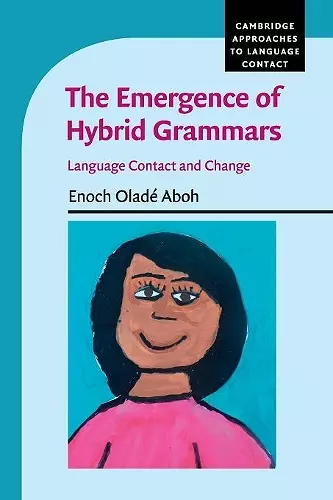The Emergence of Hybrid Grammars
Language Contact and Change
Format:Paperback
Publisher:Cambridge University Press
Published:9th May '19
Currently unavailable, and unfortunately no date known when it will be back
This paperback is available in another edition too:
- Hardback£114.00(9780521769983)

This account of language acquisition in a multilingual context explains how hybrid grammars develop and can result in language change.
Based on a detailed study of creole languages, this book contributes to the debate on language acquisition and change by showing that language acquisition requires contact between different linguistic sub-systems that feed into the hybrid grammars that learners develop. Competition between these grammars may eventually result in language change.Children are extremely gifted in acquiring their native languages, but languages nevertheless change over time. Why does this paradox exist? In this study of creole languages, Enoch Oladé Aboh addresses this question, arguing that language acquisition requires contact between different linguistic sub-systems that feed into the hybrid grammars that learners develop. There is no qualitative difference between a child learning their language in a multilingual environment and a child raised in a monolingual environment. In both situations, children learn to master multiple linguistic sub-systems that are in contact and may be combined to produce new variants. These new variants are part of the inputs for subsequent learners. Contributing to the debate on language acquisition and change, Aboh shows that language learning is always imperfect: learners' motivation is not to replicate the target language faithfully but to develop a system close enough to the target that guarantees successful communication and group membership.
'Enoch Oladé Aboh's book is a tour de force as it weaves together painstakingly documented history, novel and reliable empirical bases and elegant theoretical analyses in order to draw a fascinating and often profoundly satisfying scenario of creole formation. Such a scenario will enliven and enlighten current debates in creole studies. Aboh raises the bar by many notches - way above the quality level of most other hypotheses on the market. This book is a delight as it takes us up close and personal to the theater of creole formation, from Africa to the Americas … original and insightful … This book is a refreshing contribution to creole studies and beyond, with many enriching insights for linguistic theory and for theories of language contact and language change writ large. Bravo!' Michel DeGraff, Massachusetts Institute of Technology
'In this extremely well-argued volume Aboh does two things. He argues convincingly against the imperfect second-language learning hypothesis of creole formation. He then provides a host of arguments for the competition-and-selection hypothesis with the help of creole languages, Saramaccan and Haitian, colonial languages, French and English, and African Gbe languages.' Norval Smith, Universiteit van Amsterdam
'Aboh offers compelling yet challenging arguments for the non-exceptionalism of creoles and presents the most vigorous defense of the competition and selection hypothesis.' James Essegbey, University of Florida
'This book is a major contribution to creolistics and language change in general. Its main strength is the tight link between socio-historical analysis and a linguistic theory of the emergence of creoles. The historical part presented in chapter 2 is undoubtedly an important contribution to the field. The number and quality of the quoted historical sources are impressive. [Aboh] knows West Africa and he is able to interpret the historical sources in a way that makes sense to the reader. Undoubtedly, being a speaker of (some) Gbe languages helped the author in his comparison of Gbe and Haitian/Saramaccan. There are plenty of examples and the analyses are very precise, up to the standards expected for the study of better-known languages such as English or French. The presentation of the theory (Feature Pool Hypothesis) is clear and precise and the contrast with other competing theories is grounded.' Emmanuel Schang, Linguist List
'… this book's central ideas should be enthusiastically received by the contact linguistics community, and are likely to be both implemented and elaborated upon with rewarding results … the author brings detailed understanding and penetrating analysis … I believe readers concerned with the question of how contact languages come to be will find this volume rewards a close reading, and will come away with numerous ideas for their own research …' David Douglas Robertson, LINGUIST List
ISBN: 9780521150224
Dimensions: 230mm x 153mm x 23mm
Weight: 500g
366 pages